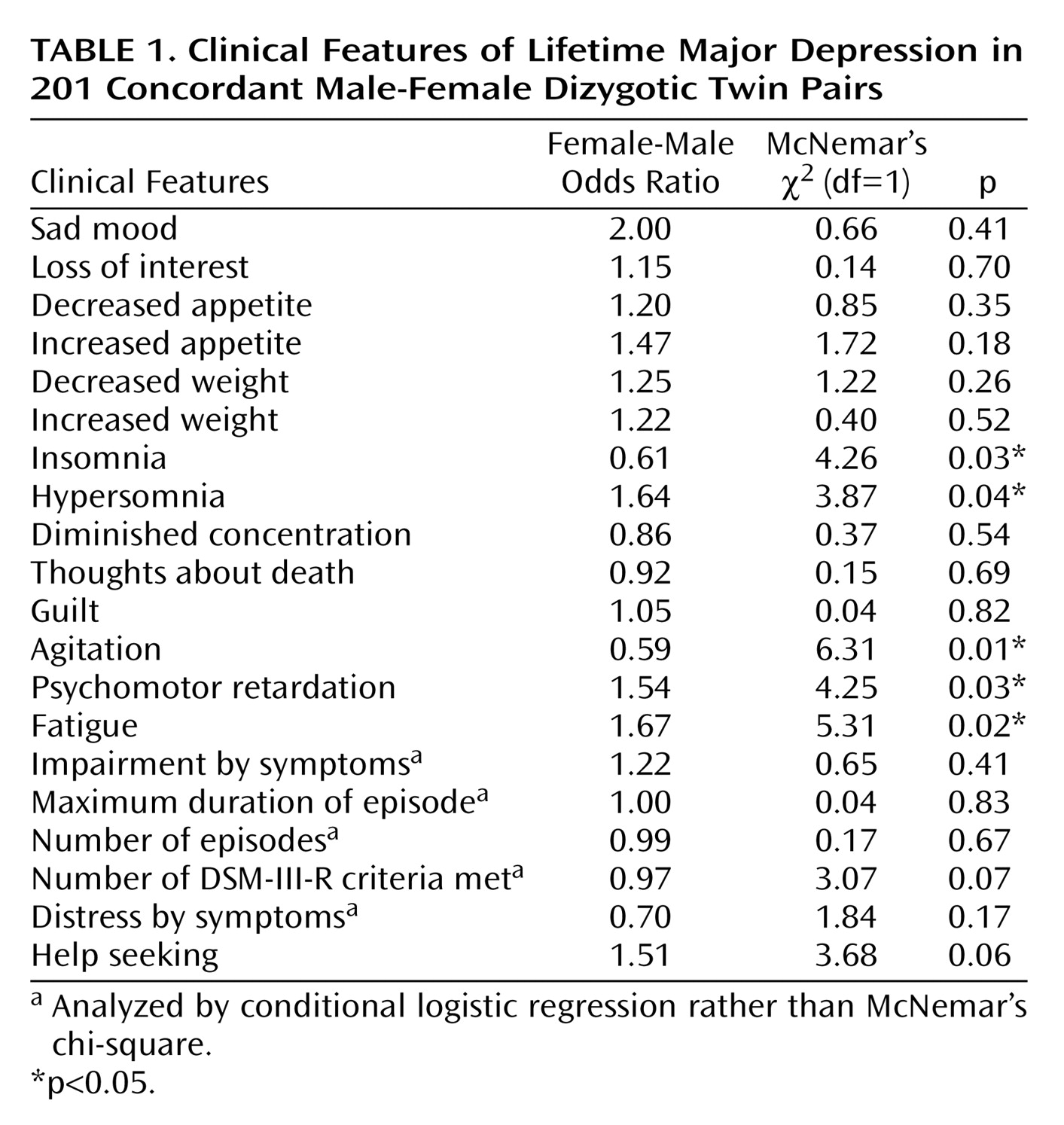Major depression is a clinically heterogeneous disorder with varying symptom patterns. Gender differences in the symptoms of depression have received limited research attention. In this study we attempted to further clarify this issue by examining male-female dizygotic twin pairs in which both twins fulfilled the DSM-III-R criteria for lifetime major depression.
Women may have a higher prevalence of atypical symptoms of depression
(1), defined in varying ways in the literature
(2). Most studies indicate that, compared to men, women have increased appetite and weight gain
(1–
5); sleep disturbance
(6–
8); particularly hypersomnia
(1,
3); fatigue
(2,
8); and psychomotor retardation
(2,
7,
9). Women also report more severe and/or a higher number of depressive symptoms, especially on self-report instruments
(3–
7,
9,
10). Men and women report similar severities of functional impairment
(3,
5,
6,
9).
These studies have several potential limitations. First, with few exceptions
(2,
3,
6,
8) the study groups have been those of convenience, with possibly different self-selection biases in men and women. Second, fewer men than women were enrolled in the studies, hence reducing the power of analysis. Third, in most studies, some evaluated symptoms were clustered, e.g., sleep disturbance instead of insomnia or hypersomnia.
To our knowledge, this is the first study examining gender differences in the symptoms of major depression in a matched, epidemiological sample (e.g., with same family of origin, age, social background, and to some extent, economic background) of dizygotic twin pairs.
Method
The twins examined in this article were from a project that studied white twins ascertained through the population-based Virginia Twin Registry. The participants ranged in age from 18 to 58 years, with a mean of 35.1 years (SD=9.2) at the time of the interview. The study was approved by the institutional Committee on the Conduct of Human Research. The procedure was fully explained to the participants, and oral informed consent followed by written consent was obtained. Out of 1,404 male-female dizygotic twin pairs interviewed by telephone, for this analysis we selected 201 in which both twins fulfilled the DSM-III-R criteria for major depression.
Lifetime major depression was assessed, with high interrater reliability (kappa=0.96), by structured psychiatric interview based on the Structured Clinical Interview for DSM-III-R (SCID)
(11) with a modification to independently assess the presence of the 14 disaggregated symptoms (e.g., we separately recorded weight loss and weight gain) during the worst episode of major depression. The participants were also asked if the symptoms of depressed mood or anhedonia were the result of any physical illness, medications, or uncomplicated grief, and an affirmative answer precluded the diagnosis of major depression. Each interviewer had at least a master’s degree in social work, psychology, or another field related to mental health or a bachelor’s degree in one of these areas plus 2 years of clinical experience. The members of each twin pair were interviewed by different interviewers who were blind to co-twin diagnosis.
For dichotomous and continuous variables, McNemar’s chi-square analysis and conditional logistic regression were performed, respectively. The odds ratio as constructed here reflects the change in odds per unit change of the continuous measure so that the higher-scoring member of the pair is the female co-twin. Analyses were repeated after the age at onset and help-seeking behavior were controlled for as well. This study was exploratory in nature, and correction for multiple comparisons was not done.
Results
As seen in
Table 1, women significantly more frequently reported symptoms of fatigue, hypersomnia, and psychomotor retardation, whereas men reported significantly more insomnia and agitation. Women also reported more depression-related help-seeking behavior, although the difference fell short of significance. There were no significant differences between men and women in appetite/weight change or impairment. These results did not change significantly after the age at onset and help-seeking behavior were controlled for.
Discussion
Our results are generally consistent with those in most previous studies. However, we did not find significantly greater appetite or weight increase in women than in men during a major depressive episode, a finding that is consistent with those in some
(7,
9,
10) but not other
(1–
5) studies. Our observation cannot entirely be explained as an artifact of the effect of recall or measurement procedure because, like this study, most of the previous studies also used patient report. In one study in which actual weight measurements were available for study subjects
(12), greater weight gain in women was observed, although the difference was not statistically significant.
There are many plausible explanations for the observed gender difference in major depression, ranging from the effects of recall, social roles and cultural norms, and adverse life events to different exposure to gonadal hormones, dysregulation of the adrenal axis, and genetic factors
(13). These results may further substantiate our previous finding
(14) that some genetic risk factors influencing liability to major depression in men and women might act differently.
The results of this study should be interpreted in the context of five potential methodological limitations. First, diagnostic assessment in this study group was completed by telephone. However, studies have shown little difference in the assessment of psychiatric disorders between telephone and face-to-face interviews
(15). Second, because of its low prevalence and low reliability in general population samples
(16), mania was not assessed in our male-female twin pairs. Therefore, in this analysis we could not distinguish persons with major depression from those with bipolar disorder. Third, we did not correct for multiple testing, and it is therefore possible that some of the reported significant findings reflect false positives. However, the overall pattern of results, five significant findings in 20 tests, is itself unlikely to occur by chance (p=0.002)
(17), particularly when the results are mostly consistent with the previous research as well. Fourth, the study was not controlled for pregnancy- or menstruation-related mood changes or treatment received, particularly differential medication use by women (e.g., contraceptives) during the depressive episode. Fifth, all of the subjects were white, so the results cannot be extrapolated to other ethnic groups.


